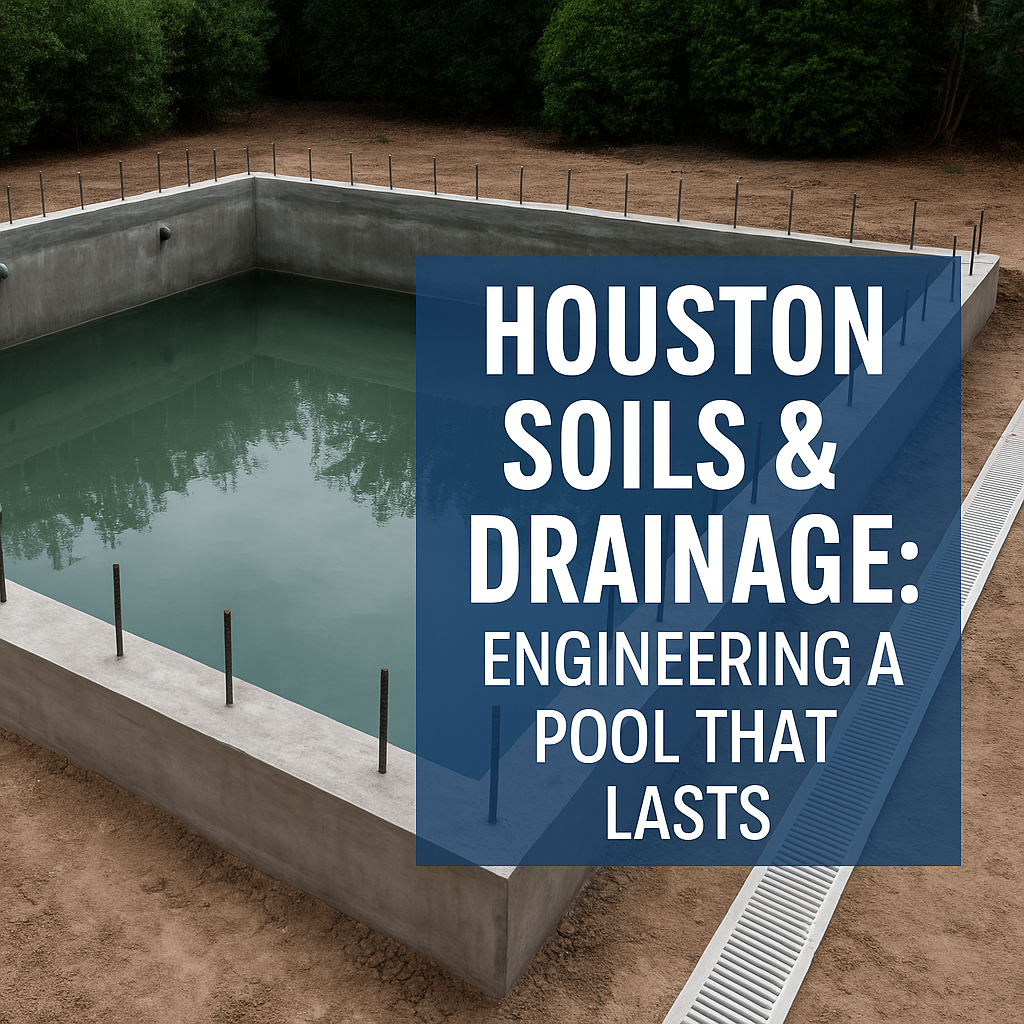Houston Soils & Drainage: Engineering a Pool That Lasts
Houston is no stranger to extreme weather, heavy rain, humidity, flash floods, and long dry spells define the local climate. But beneath the surface, another force quietly shapes the durability of outdoor infrastructure: the soil. For homeowners building a pool, ignoring Houston’s unique geology and drainage patterns is a recipe for cracks, shifting decks, and long-term maintenance headaches.
Here’s what you need to know to build a swimming pool that stands up to Houston’s volatile ground, and how smart engineering can protect your investment.
Soil Challenge: Clay, Movement, and Moisture
The dominant soil type in the Greater Houston area is expansive clay, also known as “gumbo clay.” It has two major characteristics that affect pool construction:
- Swelling and shrinking: Houston clay expands dramatically when wet and contracts just as powerfully when dry. This cycle causes ground movement, often vertically, which puts stress on concrete structures like pools, decks, and patios.
- Poor drainage: Clay holds water longer than sandy or loamy soils. After a heavy rain, the soil doesn’t just get wet, it stays wet, putting hydrostatic pressure on pool walls and affecting foundation stability.
These conditions don’t make pools impossible. But they demand a tailored engineering approach from the start.
Evaluation: Don’t Skip the Soil Test
Before excavation, a geotechnical engineer should perform a soil test on your property. This isn’t just a formality, it’s the foundation of your design plan.
A proper soil report will:
- Identify soil composition and depth
- Determine bearing capacity
- Measure moisture content
- Highlight expansive characteristics
- Recommend depth and type of pool foundation
In Houston, this step often reveals the need for over-excavation, digging deeper than the pool shell to replace problematic soils with stabilized fill or crushed gravel. Skipping this step may save money in the short term but could cost you thousands in future repairs.
Smart Pool Design for Shifting Ground
A one-size-fits-all pool design won’t hold up in a city like Houston. The most reliable pools share several engineering features:
1. Structural steel reinforcement
Extra rebar support in walls and floors helps resist cracks caused by soil movement.
2. Monolithic concrete pours
A single, continuous pour for the pool shell provides added strength and cohesion. This is often superior to segmented pours.
3. Hydrostatic valves
These pressure-release mechanisms prevent water buildup beneath the pool from pushing the shell upward, a real risk in Houston’s slow-draining soils.
4. Perimeter drainage systems
Grading and French drains surrounding the pool deck redirect rainwater away from the structure, reducing saturation and lateral pressure.
5. Deck expansion joints
Flexible joints allow concrete decking to move without cracking when the soil shifts.
Your contractor should also account for Houston’s high water table, especially in neighborhoods near bayous or flood zones. Waterproofing and proper backfill are essential.
Drainage: The Unsung Hero of Pool Longevity
Drainage is often treated as an afterthought, but in Houston, it should be a top design priority.
Without proper drainage:
- Pool decks can heave or settle unevenly
- Pool shells may crack under soil stress
- Standing water can lead to algae, mildew, and mosquito breeding
- Landscaping erodes, creating runoff problems
Key elements of an effective drainage plan:
- Grading: The land should slope away from the pool in all directions.
- Deck drains: Collect surface water and direct it to safe discharge points.
- French drains or swales: Underground channels move water quickly away from saturated soil zones.
- Sump pumps: May be necessary in low-lying or flood-prone areas.
After your pool is complete, regular upkeep matters just as much as smart construction. Reliable pool cleaners Houston offer maintenance services that keep drainage areas clear of debris and catch early signs of cracking or soil movement
Contractor Red Flags to Avoid
Not every pool builder in Houston is equipped to handle the city’s unique soil demands. Watch for these warning signs:
- No soil testing or engineering review
- Vague answers about hydrostatic pressure mitigation
- No clear drainage plan
- Promises of rapid builds without permits or inspections
- Lack of warranty on structure or decking
Choose a contractor with a local track record and an in-house or partnered geotechnical engineer. Ask to see soil reports and drainage maps from previous projects.
FAQs
Is it safe to build a pool on clay soil in Houston?
Yes, but only with proper site preparation, structural reinforcement, and drainage. Without these, clay soil can cause long-term damage to your pool.
How do I know if my backyard has drainage issues?
Puddling after rain, soft spots in the yard, or mold on the foundation are signs of poor drainage. A grading and drainage specialist can assess the property.
Can a pool shell pop out of the ground in Houston?
It’s rare, but possible, especially if the pool is drained during wet weather and lacks hydrostatic relief valves. Always consult a pro before draining.
Do I really need a soil test before building a pool?
In Houston, yes. A soil test helps design the foundation and drainage plan that will keep your pool safe and stable for years.
What maintenance is needed for drainage systems?
Clear leaves from deck drains, check for erosion around your deck, and schedule inspections with a local service like pool cleaners Houston to stay ahead of problems.


